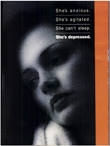Lithium and tricyclic augmentation of fluoxetine treatment for resistant major depression: a double-blind, controlled study
Abstract
Forty-one patients who had failed to respond to 8 weeks of treatment with 20 mg of fluoxetine were randomly assigned to one of three treatments for 4 weeks: 40-60 mg/day of fluoxetine, 20 mg/day of fluoxetine plus 25-50 mg/day of desipramine, and 20 mg/day of fluoxetine plus 300-600 mg/day of lithium. Patients treated with high- dose fluoxetine (N = 15) did significantly better than patients treated with fluoxetine plus lithium (N = 14) and those treated with fluoxetine plus desipramine (N = 12). High-dose fluoxetine was the most effective treatment among partial responders to previous treatment, but high-dose fluoxetine and fluoxetine plus lithium were the most effective treatments among nonresponders.
Access content
To read the fulltext, please use one of the options below to sign in or purchase access.- Personal login
- Institutional Login
- Sign in via OpenAthens
- Register for access
-
Please login/register if you wish to pair your device and check access availability.
Not a subscriber?
PsychiatryOnline subscription options offer access to the DSM-5 library, books, journals, CME, and patient resources. This all-in-one virtual library provides psychiatrists and mental health professionals with key resources for diagnosis, treatment, research, and professional development.
Need more help? PsychiatryOnline Customer Service may be reached by emailing [email protected] or by calling 800-368-5777 (in the U.S.) or 703-907-7322 (outside the U.S.).



